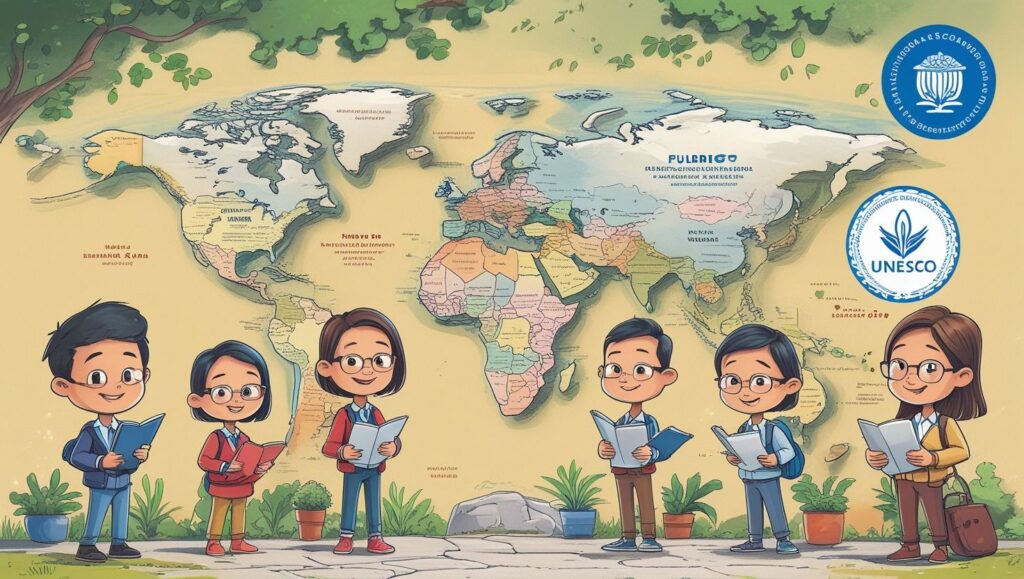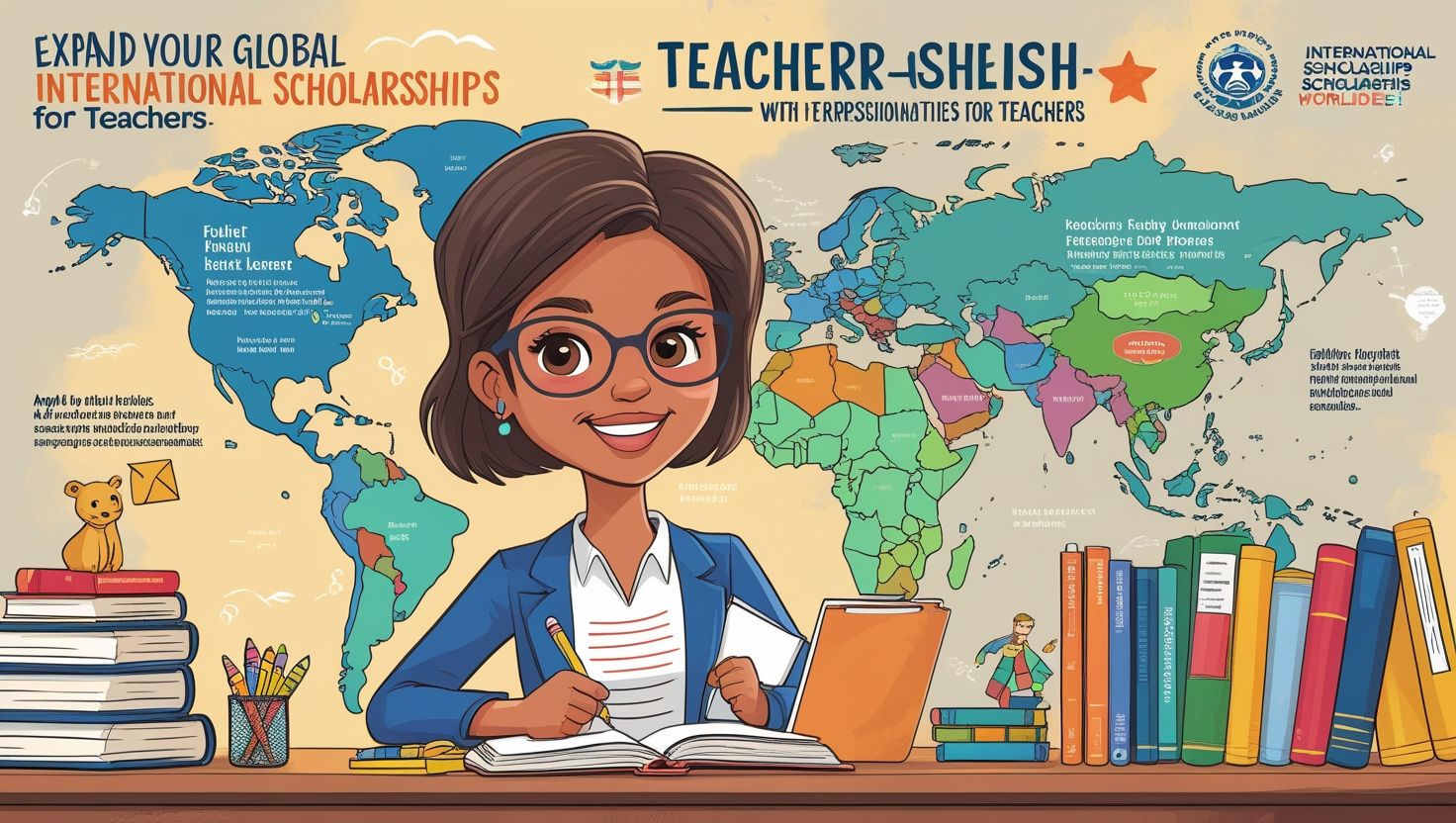Introduction
International Scholarships for Teachers, In the dynamic world of education, teachers constantly seek opportunities to enhance their professional growth. International scholarships offer an incredible platform for such growth. These scholarships are specially designed to support educators who aim to gain global exposure and upgrade their skills. Additionally, they provide a chance to collaborate with fellow educators across borders. As teaching strategies evolve, staying updated with global pedagogical trends becomes increasingly important.
Moreover, international scholarships not only benefit teachers but also uplift the education systems in their home countries. Through these programs, teachers return with innovative ideas, teaching methods, and cross-cultural understanding. As a result, they become better equipped to inspire students and fellow educators alike. Teachers from developing countries, in particular, find these scholarships life-changing. They open doors to resources, training, and academic networks otherwise unavailable.
Therefore, the availability of such scholarships plays a crucial role in professional development. Consequently, they serve as catalysts for educational reform. Undoubtedly, international scholarships are valuable for teachers who aspire to be change-makers in education.
Significance of Scholarships in Professional Development
Scholarships offer more than financial assistance. They are gateways to professional development and lifelong learning. Teachers often face limitations in accessing high-quality training, especially in under-resourced areas. However, international scholarships remove these barriers and empower educators. By participating in global programs, teachers can experience different education systems and techniques.
Furthermore, scholarships allow teachers to pursue degrees, certifications, and workshops that are internationally recognized. This recognition boosts their confidence and career prospects. In addition to this, exposure to global learning environments enhances their critical thinking and adaptability. These skills are essential for addressing challenges in modern classrooms.
Equally important, such programs create global networks. Teachers get the chance to connect with peers from different cultures. Through this, they exchange ideas and build collaborative teaching practices. As a result, these networks lead to long-term educational partnerships. Consequently, scholarships contribute not only to individual development but also to systemic improvement. Therefore, they are essential tools for equipping teachers with the knowledge and skills required for the future.
Popular International Scholarship Programs for Teachers
There are numerous prestigious scholarship programs available to teachers globally. Each program offers unique benefits tailored to professional development. One well-known initiative is the Fulbright Distinguished Awards in Teaching Program. This U.S.-based scholarship enables teachers to research and share educational practices worldwide. Similarly, the Commonwealth Scholarship allows educators from Commonwealth countries to study in the UK. It covers tuition, travel, and living expenses.
Another remarkable program is the Chevening Scholarships offered by the UK government. Teachers with leadership potential can benefit immensely from it. Likewise, the Erasmus+ Program from the European Union supports educational staff in participating countries for training and teaching exchanges. Additionally, the Australia Awards provide teachers from developing nations opportunities to study in Australia and return with advanced knowledge.
Furthermore, many universities also offer teacher-specific fellowships. These include Stanford’s Global Education Leadership Program and Harvard’s Teacher Education Program. With such vast options, teachers must explore thoroughly to find a match. Importantly, all these scholarships aim to enrich teaching practices and promote educational equity.

Eligibility and Application Requirements
Before applying for international scholarships, teachers must understand eligibility criteria. Typically, applicants must have a bachelor’s degree and a few years of teaching experience. In many cases, scholarships also require proof of English proficiency, such as IELTS or TOEFL scores. Additionally, a strong academic background and recommendation letters are crucial.
However, meeting eligibility is just the first step. Teachers must also prepare a compelling application. Most programs require a statement of purpose. This should clearly express career goals, reasons for applying, and expected impact. Furthermore, having a strong resume detailing teaching achievements adds value. Demonstrating leadership and commitment to education also boosts selection chances.
In some cases, applicants must submit a research proposal or lesson plan. This reflects their teaching approach and innovation. Additionally, some scholarships conduct interviews to assess suitability. Therefore, preparation and confidence are vital. Besides, adhering to deadlines and following guidelines ensures a smoother process. Ultimately, teachers who meet the criteria and submit well-prepared applications significantly improve their chances of success.
Benefits Beyond Financial Support
International scholarships provide far more than financial relief. Undoubtedly, covering tuition and travel is essential, but the real value lies in the broader experience. Teachers who study abroad gain cultural exposure, which is invaluable in today’s global classrooms. Through interactions with international peers, they develop empathy, communication, and problem-solving skills.
Moreover, these experiences build confidence. Teachers return home with a sense of accomplishment and a broader vision. In many cases, scholarship recipients become education leaders in their communities. They inspire colleagues and introduce new teaching methods. Consequently, their schools benefit from their enhanced expertise.
Furthermore, scholarship programs often include mentorship, internships, or classroom training. These components help teachers refine their practice. Additionally, gaining access to international libraries and research resources allows for deeper learning. In the long run, these benefits lead to improved student outcomes.
Indeed, international exposure strengthens professional identity. It encourages innovation and lifelong learning. Therefore, scholarships shape teachers into global educators. They not only change lives but also transform classrooms and communities for the better.
Challenges Faced by Teachers in Securing Scholarships
While international scholarships offer great advantages, obtaining them is not without challenges. One major issue is lack of information. Many teachers, especially in rural areas, are unaware of available opportunities. Additionally, limited access to the internet or digital resources further hinders their ability to research scholarships.
Furthermore, application procedures can be complex and time-consuming. Preparing documents, writing essays, and meeting deadlines require effort. For teachers juggling full-time jobs and family responsibilities, this becomes overwhelming. Moreover, meeting language requirements like IELTS adds to the pressure. These tests are expensive and require preparation time.
Another challenge is the competition. As many scholarships are highly competitive, only the best candidates are selected. Consequently, teachers with fewer academic achievements or limited support may struggle. Additionally, visa processes and adjusting to new cultures can be difficult.
Despite these hurdles, many teachers succeed through determination and planning. With guidance and support from past recipients or mentors, challenges can be overcome. Therefore, it is essential to raise awareness and build support systems to help more teachers access these life-changing opportunities.

Role of Governments and NGOs in Promoting Scholarships
Governments and non-governmental organizations (NGOs) play a crucial role in promoting international scholarships. Many governments fund programs to build the capacity of their teaching workforce. By doing so, they ensure better education outcomes for future generations. These initiatives often target teachers from underserved regions to promote equality.
In addition, NGOs work closely with international partners to create scholarship programs. They provide information, mentoring, and even financial aid for application-related costs. Furthermore, NGOs help teachers prepare for language tests or application interviews. This level of support increases the success rate of applicants.
Moreover, education departments can organize workshops and counseling sessions. These events help teachers understand available opportunities and application procedures. Besides, governments can also form partnerships with universities abroad to create exclusive fellowships.
Another important role is post-scholarship engagement. Governments and NGOs can facilitate returning teachers in applying their skills. They might be placed in leadership roles or involved in teacher training programs. Thus, collaborative efforts between governments and NGOs enhance access and success in international scholarships for teachers.
Impact of Scholarships on Classroom Practices
Teachers who gain international experience bring positive changes to their classrooms. Exposure to new teaching methodologies allows them to adopt innovative practices. For example, they may implement student-centered learning, problem-based teaching, or digital tools. These methods often improve student engagement and learning outcomes.
In addition, teachers introduce global perspectives. This encourages students to think beyond local boundaries and become more open-minded. Furthermore, teachers become role models. Their achievements motivate students to set higher academic and personal goals.
Moreover, scholarship recipients often promote inclusive education. Having seen diverse learning environments, they better support students from various backgrounds. Also, their communication and classroom management skills tend to improve.
Equally important, they share their learning with colleagues. Through workshops or informal mentoring, they help improve overall school performance. In some cases, they lead curriculum reforms or start educational initiatives.
Thus, the impact of scholarships is long-lasting and widespread. It transforms not just the teacher, but also the entire school environment. Consequently, investing in international opportunities leads to improved education quality across the board.
Tips for Applying Successfully
To increase the chances of success, teachers should follow specific strategies when applying for scholarships. First, research thoroughly. Identify scholarships that align with your career goals and expertise. Read eligibility criteria carefully before starting your application.
Second, plan ahead. Give yourself enough time to gather documents, prepare for language tests, and write essays. Rushing through applications often leads to errors and weak submissions. Additionally, seek feedback. Ask mentors or colleagues to review your statement of purpose or CV.
Third, be authentic and specific. Clearly explain why the scholarship matters to you. Highlight your achievements and explain how you plan to use the experience. Avoid generic answers. Instead, provide real-life examples of your impact as a teacher.
Also, focus on leadership and innovation. Scholarship committees often look for educators who can bring change. Therefore, showcase any projects or initiatives you’ve led. Finally, stay positive. Even if you don’t succeed the first time, learn from the experience and try again.
With preparation and determination, success becomes achievable.
Conclusion: Transforming Education Through Global Opportunities
In conclusion, international scholarships are vital in transforming education through empowered teachers. They offer much more than financial support. From global exposure to professional development, the benefits are profound. Teachers return with new skills, global networks, and renewed passion for teaching.
However, challenges remain. Many educators lack access to information and resources needed to apply. Therefore, governments, NGOs, and educational institutions must work together to raise awareness. Providing guidance and simplifying application processes can help many more teachers access these golden opportunities.
Furthermore, the long-term impact of scholarships on classrooms and communities cannot be overstated. Teachers not only improve their own practice but also inspire those around them. Ultimately, investing in international scholarships is an investment in quality education for all.
For teachers with vision and commitment, these scholarships are stepping stones to becoming global educators. Through their growth, they uplift education systems, foster innovation, and shape brighter futures. Thus, international scholarships are not just awards—they are instruments of transformation and hope.
Top 10 Websites for International Scholarships for Teachers
- Fulbright Distinguished Awards in Teaching
- Offers research and professional development opportunities for teachers worldwide through U.S. Department of State.
- Commonwealth Scholarship Commission (CSC)
- UK government scholarships for teachers from Commonwealth countries pursuing master’s and professional development.
- Chevening Scholarships
- UK government-funded global scholarship program ideal for teacher-leaders.
- Australia Awards Scholarships
- Supports teachers from developing countries for higher studies in Australia.
- Erasmus+ Programme
- EU program for teachers offering mobility, training, and teaching fellowships.
- UNESCO Fellowships
- Offers training and research opportunities for teachers and educators globally.
- Education New Zealand Scholarships
- Scholarships for international educators interested in studying in New Zealand.
- DAAD (German Academic Exchange Service)
- Germany-based scholarships for teachers interested in academic development.
- International Education and Resource Network (iEARN)
- Offers teacher exchanges and collaborative projects with funding.
- Teach Abroad Programs – GoAbroad
- Aggregates teaching opportunities and scholarships from around the world.

Keep writing! Your content is always so helpful.
Your content never disappoints. Keep up the great work!